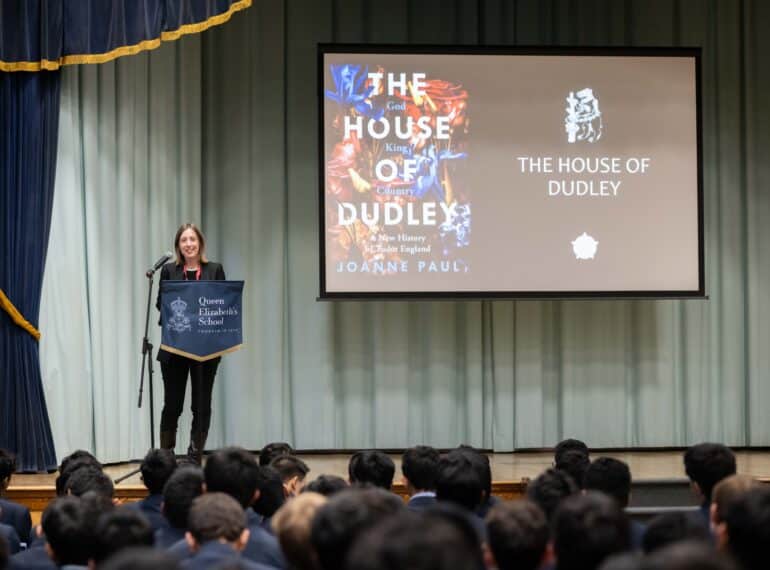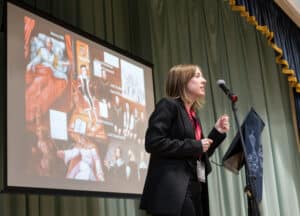Discovering the Dudleys: academic sheds light on family with huge significance for QE – and for the nation, too

In one of the final special activities for QE’s 450th anniversary year, historian Joanne Paul delivered a talk on the family of Robert Dudley – a figure of enormous importance in the School’s founding, second only to Queen Elizabeth I herself.
 Dr Paul, author of the acclaimed 2022 book, The House of Dudley, delivered a lecture assembly to Years 8 & 9, before conducting a source-based workshop to A-level historians.
Dr Paul, author of the acclaimed 2022 book, The House of Dudley, delivered a lecture assembly to Years 8 & 9, before conducting a source-based workshop to A-level historians.
It was at the request of Robert Dudley, Earl of Leicester, that Elizabeth I granted the royal charter founding the School in 1573. But, Dr Paul argued, the significance of the Dudley family extended well beyond the life and achievements of its most famous son: it was the Dudleys who shaped, defined and even made the Tudor dynasty.
An Honorary Senior Lecturer at the University of Sussex who now works freelance on various projects, she specialises in the Early Modern Period, including both the Tudors and the Stuarts.
 Headmaster Neil Enright said: “We are tremendously grateful to Dr Paul for giving us her time and providing these insights into the family as we wrap up our anniversary year. It seems clear that without the Dudleys, not only would Queen Elizabeth’s School not exist, but neither would the Tudors – or not as we know them, in any case.”
Headmaster Neil Enright said: “We are tremendously grateful to Dr Paul for giving us her time and providing these insights into the family as we wrap up our anniversary year. It seems clear that without the Dudleys, not only would Queen Elizabeth’s School not exist, but neither would the Tudors – or not as we know them, in any case.”
In a lecture in the Main School Hall, which featured a presentation lavishly illustrated with portraits from the period, the younger boys looked at the rise, fall, rise, fall and rise again of the House of Dudley. Dr Paul identified five respects in which she considered the family particularly important:
- Edmund Dudley’s fundraising for Henry VII: enabled by his intimate legal knowledge of the King’s prerogative, and ruthless exploitation of these often-archaic points of law, this allowed for the grandeur of King Henry VIII’s reign, even if it made Edmund so unpopular that he was imprisoned and eventually executed.
 John Dudley’s success in building up the Royal Navy, as Admiral of the Fleet. He prepared it for the successes it was to enjoy in the second half of the 16th century. He added to the fleet and to the armoury, while developing Portsmouth as a great port. His military experience and leadership were important at the 1545 Battle of the Solent against the French, which, Dr Paul said, was a greater threat to England than the later Spanish Armada. John Dudley was nearly on the Mary Rose, which famously sank, but had moved across to the larger Great Harry with the king, Henry VIII.
John Dudley’s success in building up the Royal Navy, as Admiral of the Fleet. He prepared it for the successes it was to enjoy in the second half of the 16th century. He added to the fleet and to the armoury, while developing Portsmouth as a great port. His military experience and leadership were important at the 1545 Battle of the Solent against the French, which, Dr Paul said, was a greater threat to England than the later Spanish Armada. John Dudley was nearly on the Mary Rose, which famously sank, but had moved across to the larger Great Harry with the king, Henry VIII.- Their involvement in the nine-day reign of Lady Jane Grey. At the point of Edward VI death’s, she was actually Lady Jane Dudley, having married Guildford Dudley (son of John Dudley and brother of Robert). John Dudley, Duke of Northumberland, is considered to have engineered her accession. Jane, Guildford and John were all executed under Mary I.
- Robert Dudley’s role as royal suitor. It was widely reported among Europe’s ambassadors that the queen visited Robert’s bedchamber day and night. The death of Robert’s wife, Amy Robsart, in suspicious circumstances (a broken neck at the bottoms of the stairs – ruled an accident by the jury, but with suicide, and even murder, widely gossiped about) made it too scandalous for any marriage to go ahead. Robert would have known that such a reaction was likely – a good reason for doubting that he was responsible for the death, Dr Paul said. Robert Dudley was perhaps the one suitor Elizabeth seriously considered, and these events led to her remaining The Virgin Queen. Dr Paul said it was at Robert’s suggestion that Elizabeth made the famous Tilbury Docks speech in 1588 (“I know I have the body but of a weak, feeble woman; but I have the heart and stomach of a king, and of a king of England too…”)
- Robert’s patronage of the arts. This helped culture to flourish. He commissioned some 20 portraits of himself in 30 years – “more than any prince in Europe, or the queen herself” – seven of which depicted him in a pair with the queen, showing his proximity. He also supported a troupe of actors, Leicester’s Men, which had direct connections to Shakespeare.
 The boys asked many questions. One wondered why so many grammar schools like QE were established under Elizabeth. Because, Dr Paul said, men such as Robert Dudley and William Cecil, her chief adviser, had received a humanist education and sought to spread that widely. Another asked why Henry VIII had had Edmund killed, given that he had brought so much money into royal coffers. She concluded that Henry probably had no personal animus against him, but that Edmund’s unpopularity made his death a good political move.
The boys asked many questions. One wondered why so many grammar schools like QE were established under Elizabeth. Because, Dr Paul said, men such as Robert Dudley and William Cecil, her chief adviser, had received a humanist education and sought to spread that widely. Another asked why Henry VIII had had Edmund killed, given that he had brought so much money into royal coffers. She concluded that Henry probably had no personal animus against him, but that Edmund’s unpopularity made his death a good political move.
Dr Paul also spoke of her two favourite things about the Dudleys. Firstly, she relished the fact that a non-royal family could have so much power and influence, and liked the dramatic story of their ups and downs. Secondly, she appreciated that it was the women of the family who were so often at the heart of rescuing and restoring the family name when it had fallen.
With the A-level course including the Stuart period, the Sixth Form workshop focused on changing ideas of counsel under the Stuarts.
The boys looked at the XIX Propositions – the 19 demands made of Charles I by the Long Parliament in 1642 – and at the chapter on counsel in Hobbes’s Leviathan, and then came together to discuss.
A signed copy of Dr Paul’s book is now available for boys to borrow from The Queen’s Library.
